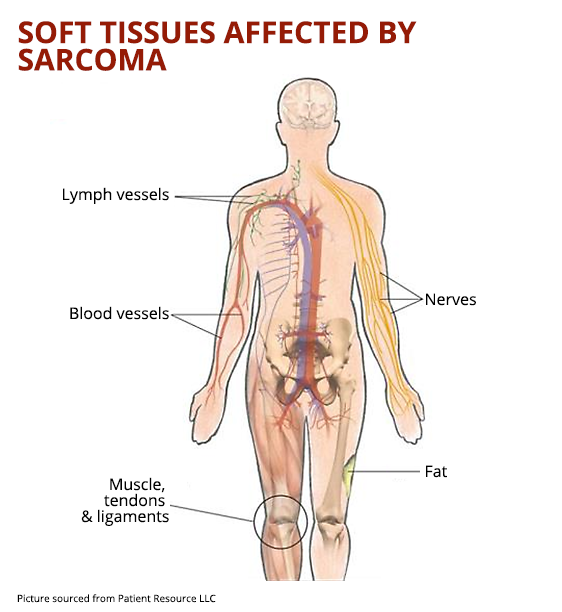Soft Tissue Sarcoma

Soft tissue sarcoma is a rare type of sarcoma that develops in connective tissues such as fats, muscles, nerves, deep skin tissues and blood vessels. These tissues support and connect all the organs and structures of the body.
Usually forming first as a painless lump (tumour), soft tissue sarcoma is most commonly developed in the thigh, shoulder and pelvis. Sometimes they can grow in the abdomen or chest (trunk).
Subtypes of Soft Tissue Sarcoma
There are over 70 different subtypes of soft tissue sarcoma and they are named after the abnormal cells that make up the sarcoma.
Most common subtypes of soft tissue sarcoma include:
- Undifferentiated pleomorphic sarcoma (previously known as malignant fibrous histiocytoma) from abnormal spindle-shaped cells
- Liposarcoma from fat tissue
- Leiomyosarcoma and Rhabdomyosarcoma from muscle tissues
- Angiosarcoma from blood vessels
- Malignant Peripheral Nerve Sheath Tumour (MPNST or PNST)
- Gastrointestinal Stromal Tumour sarcoma (GIST) (this is treated differently from other types of soft tissue sarcoma)
- Synovial sarcoma
Causes
Cancer occurs when cells multiply uncontrollably, forming growths called tumours. While the causes of most sarcomas are generally unknown, there are several risk factors.
Risk Factors
Factors that may increase a person’s risk of soft tissue sarcoma include:
- Radiotherapy
- There is risk for people who've had . The risk is higher for people who had high doses of at a very young age. However, most people who have had in the past won't develop a sarcoma.
- Inherited syndromes
- A risk of soft tissue sarcoma can from your parents.
- syndromes that increase your risk include hereditary retinoblastoma, Li-Fraumeni syndrome, familial adenomatous polyposis, neurofibromatosis, tuberous sclerosis and Werner syndrome.
- Chemical exposure
- Exposure to certain chemicals, including vinyl chloride, dioxins and herbicides, has been associated with increased rates of soft tissue sarcomas.
Symptoms
Soft tissue sarcomas often have no obvious symptoms in the early stages, but can cause symptoms as they get bigger or spread. The symptoms depend on where the cancer develops.
You should see your GP if you have a worrying lump – particularly one that is getting bigger over time or is the size of a golf ball or larger – or any other troublesome symptoms.
Although it is much more likely you have a non-cancerous condition, such as a cyst (fluid under the skin) or lipoma (fatty lump), it's important to get your symptoms checked out.
Diagnosis
If your GP feels there's a possibility you have cancer, they'll refer you for a number of hospital tests.
Diagnosis for soft tissue sarcoma will usually be made by a health specialist and will be based on your symptoms, physical examination and the results of:
- Scans – an ultrasound scan is the first test performed and is ; further scans such as computed tomography (CT) and magnetic resonance imaging (MRI) scans may later.
- Biopsy – a sample of suspected cancerous tissue is removed using a needle during an operation, so it can be tested and analysed in a laboratory.
If a diagnosis of a soft tissue sarcoma is confirmed, a pathologist will further examine how likely the cancer is to spread (known as grade), and whether or how far the cancer has spread (known as stage).
Treatment
People with a soft tissue sarcoma are cared for by a multi-disciplinary team (MDT) of health specialists (usually pathologists, radiologists, surgeons, radiation oncologists, medical oncologists and paediatric oncologists), who will help decide on the most appropriate treatment.
Treatment decision depends on factors such as the tumour location, the subtype of sarcoma, how far it has spread, age and general health.
The main treatments are:
- Surgery – removing any tumour is the treatment for most types of soft tissue sarcoma.
- Radiotherapy – the use of high-energy radiation to kill cancer cells.
- Chemotherapy – the use of anti-cancer drugs to kill cancer cells.
These treatments can be given alone or in combination.
Information sourced from:
- Cancer Council Victoria - https://www.cancervic.org.au/cancer-information/types-of-cancer/soft_tissue_cancers/soft-tissue-cancers-overview.html
- Kick Sarcoma - https://kicksarcoma.org.sg/what-are-sarcomas/types-of-sarcomas/
- NHS - https://www.nhs.uk/conditions/soft-tissue-sarcoma/
- Mayo Clinic - https://www.mayoclinic.org/diseases-conditions/soft-tissue-sarcoma/symptoms-causes/syc-20377725
- The Liddy Shriver Sarcoma Initiative - http://sarcomahelp.org/sarcoma-treatment.html#tpm1_3

